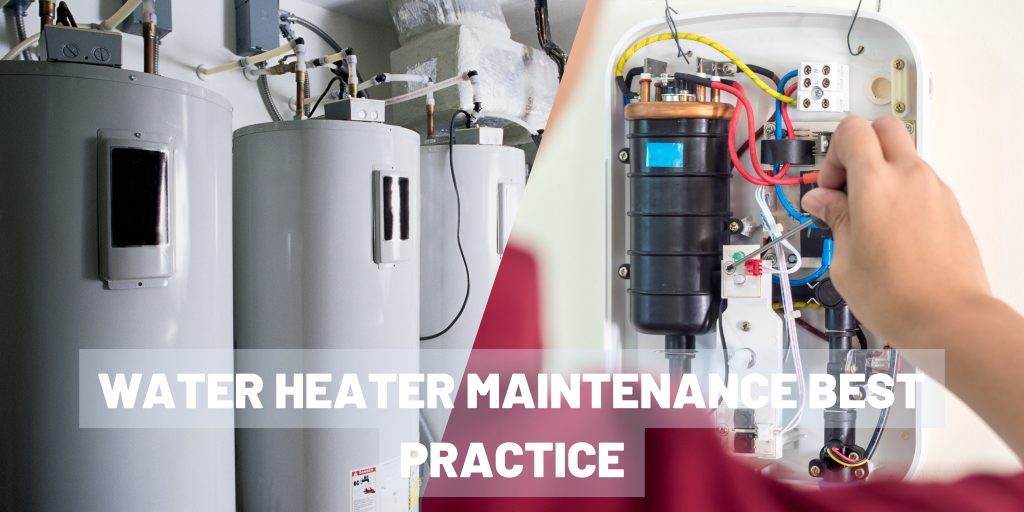- Serving Our NJ Neighbors 24/7 (888) 333-2422
WATER HEATER MAINTENANCE BEST PRACTICES

After a hard day, there is nothing better than a warm shower—unless your water suddenly goes cold and you have to deal with a failing water heater. Understanding how your water heater functions, how to maintain it, and what may go wrong can help you maintain a pleasant water temperature in your New England home all year long.
WATER HEATER MAINTENANCE WHAT CAN GO WRONG AND WHAT TO DO
What is the model of your water heater?
Water heaters deserve a tip for their incredibly quick service; in a matter of seconds, they’re in charge of providing hot water to all of your faucets and appliances. The bottom of your water heater tank receives water from the water pipes in your home, which is then heated there. The water rises as it warms and ultimately leaves at the top to be
Type and size of water heaters
Tank and thankless water heaters are the two primary varieties. In large metal cylinders or towering drums that are typically found in your basement or laundry area, traditional types store and warm water. In a tankless system, water is heated as it circulates through pipes by a gas burner or electric element.
The decision between the two ultimately comes down to your budget, fuel source demands for your home, and water heater size requirements. It will seem like running a marathon to attempt to keep a water heater that is the incorrect fit. But even when everything fits well, you should be on the lookout for potential problems.
Common mistakes with water heaters
Don’t allow these typical water heater issues make you uneasy. Many of them may be identified by you and dealt with before they worsen.
Leaking water heater
You can be dealing with loose hot water exit pipes, cold water input pipes, relief valves, or inlet valves if your water heater is dripping from the top. To determine whether the leakage stops, you can try tightening them using an element wrench. In vain? Perhaps your tank is rusty; it’s time to replace it!
Your tank may be dripping from the bottom. A leaking or loose drain valve, condensation (try raising the temperature), or tank over-pressurization might be the cause. Whether anything is loose, try tightening it with a tool. If you find leakage coming from your relief valve, verify if your thermostat’s temperature is set too high (it should be around 120 degrees Fahrenheit). If this doesn’t work, corrosion could be the cause, in which case replacement is the best course of action.
Water heater not heating (or heating too much) :
There are a number of reasons why your water can be ignoring you or, even more unpleasant, being overly friendly:
No hot water: Can’t get out of the ice-cold water? First, examine whether the circuit breaker for your water heater has tripped. If so, turn it off before turning it back on. Perhaps your thermostat tripped as well. If none of these things address the problem, it could be necessary to replace the heating components. Check to see whether you have gas flow and that your pilot light is on if you have a gas water heater.
Not enough hot water: Your thermostat setting may need to be increased, or your unit may be too small for your home’s hot water needs, if the temperature of your water isn’t nearly hot enough.
Too Hot: If the water in your home is too hot, your thermostat may need to be adjusted because it is set too high.
Is your comfort at home still being disturbed by your hot water problem? For information on the thermostat and size of your water heater in the New England region, get in touch with us.
Pilot light for water heater:
You can have a filthy, bent, or broken thermocouple if the pilot light on your gas water heater keeps going out.
Your thermocouple has to be cleaned if it is dirty. Close the main gas supply valve and let the thermocouple cool before using sandpaper to remove gunk.
Thermocouple that is bent or too far from the pilot light can be manually straightened or moved to just barely wrap around the blue flame. Turn off the main gas supply valve and wait for the thermocouple to cool before doing this.
Water heater noises:
The purpose of your water heater is not to make sounds; if it is, sediment accumulation in the tank’s bottom is probably the cause of the noise. You may try completely emptying the tank, opening the cold water intake, and then filling the tank halfway while letting the stream rinse away the sediment within to attempt flushing the sediment out. Until there is no longer any sediment, drain the water through the drain valve and repeat the procedure.
Smelly or Rusty Hot Water:
You’ll need a new water heater if sediment accumulation has caused your tank to corrode and leak. You may avoid these problems in the future by doing preventative maintenance like installing a water softener and cleaning your water heater once or twice a year.
THE IMPORTANCE OF MAINTENANCE FOR WATER HEATERS
Water heaters unfortunately don’t last forever. A water heater’s lifetime is between 8 and 12 years, making adequate maintenance crucial. Here are some DIY maintenance tips that you might try:
Set the thermostat: Set the thermostat on your water heater to 120 degrees to adjust the temperature. By doing this, you may save your energy bills by up to 5% for every 10 degrees you lower the thermostat.
Wash out sediment: Drain the water from your tank many times a year to wash out sediment accumulation that may result in serious issues and long-term harm to your appliance.
Perform Tests: Testing the functioning of your water heater involves immediately raising the temperature-pressure valve and repeatedly letting some water flow out. Check to verify whether water is still flowing after the test; if so, a replacement is required.
Insulate your pipe: Consider using fiberglass pipe wrap to insulate your pipes to keep them safe and extend their lifespan.
Check the anode rod: After your water heater has been operating for two or three years, and then once a year after that, check the anode rod. It’s time to replace your anode rod if you see significant losing metal plating or full missing pieces.
After every two to three months is the ideal time to inspect your water heater for any problems, such as leaks. Water heaters aren’t indestructible, even with regular maintenance. If you’re having problems with your water heater or need to replace it in the New England region, () can provide you with dependable service.
In addition, one of our Remote Assist professionals may guide you through your water heater system and identify any problems .





